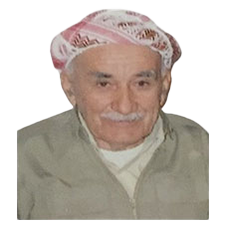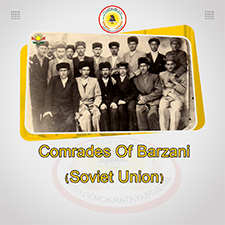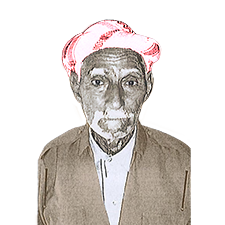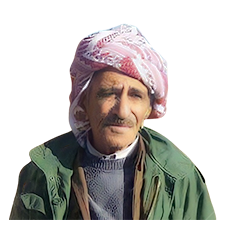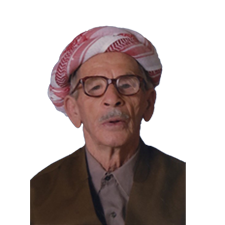Biography
He was born in 1925 in Kurke village, Goratu sub-district, Mergasur district, Erbil province. He studied in the Soviet Union and received his degree in agriculture from the Soviet Union's Divinko University. He was fluent in Kurdish and Russian. He died on March 24-25, 2011.
Service Record
In 1943, he joined the ranks of the Second Barzan Revolution. He participated in the conquest of a number of police stations; Chami Police Station on October 20, 1943; Goratu Police Station on November 6, 1943, the Mazne police station on November 1943. On August 1945, all his property, mobile and non-mobile property was confiscated by order of the Iraqi Military Customary Court. On September 5, 1945, he participated in the takeover of Maidan Morik police station and the battles of Kunaruviye, Ble, Barzan, and Rezani.
After the failure of the Second Barzan Revolution on October 11, 1945, he moved to East Kurdistan. On March 31, 1946, he joined the Barzani forces of the Kurdistan Democratic Republic Army. On April 29, 1946, he participated in the Battle of Qarawa in Saqiz region. On May 3, 1946, he also participated in the Battle of Malqarani. After the failure of the Kurdistan Democratic Republic, he participated in the Battle of Nalos on March 3, 1947, and the Battle of Gujari on March 13-14, 1947. He was one of the Peshmergas who returned to Sherwan and Mazuri on 19 April 1947 through Khawkurk and Barazgar in North Kurdistan.
After their return, General Mustafa Barzani held a meeting with his comrades in the village of Argosh on 15 May 1947. He gave his comrades a free choice whether they want to stay or go to the Soviet Union. All his comrades decided to continue and leave for the Soviet Union. On May 23, 1947, Saleem accompanied General Mustafa Barzani to the Soviet Union and participated in the Battle of Qtur People and the Battle of Mako Bridge. On June 18, 1947, after plenty of difficulty, he crossed the Aras River on the border between Iran and the Soviet Union.
After arriving in the Soviet Union, on June 19, 1947, he and all his comrades were detained in Nakhchivan, Azerbaijan, for forty days in an open community surrounded by barbed wire and guarded by soldiers. In terms of food, clothing, and transportation, they had been treated as prisoners of war. They were later divided into the regions of Aghdam, Lachin, Ayulakh, and Kalbajar in the Republic of Azerbaijan on the decision of the Soviet government. On December 10, 1947, they were transferred to a military base on the Caspian Sea in Baku, the capital of the Republic of Azerbaijan. On the 23rd of the same month, they were given military uniforms and received eight hours of daily military training under the supervision of officers of the Republic of Azerbaijan. At the same time, they were taught Kurdish for four hours a day by some of their educated comrades.
After Jafar Bakirov's mistreatment of his comrades, Barzani decided to move his military camp from Azerbaijan on August 29, 1948, to the community of Chirchuk near Tashkent, the capital of Uzbekistan, where they continued their military training.
In March 1949, he and his comrades were distributed by train to the villages of the Soviet Union and worked on the farms of the “Kolkhozes” (land that people rented from the government and then gave a share of the product to the government).
After much effort and sending several letters by General Barzani to Stalin, Stalin finally received a letter in which Barzani talked about the suffering of his comrades. He immediately decided to form a committee to investigate the situation of Barzani's comrades. The committee finally decided to gather them all in Vrevsky, so in November 1951, General Barzani and his comrades went to Vrevsky, Soviet Union.
After the July 14, 1958 revolution in Iraq and the return of General Mustafa Barzani, on February 25, 1959, according to both Articles 3 and 7, paragraph (a) of Article 10 and according to Article (11), and based on the amended law No. 19, General Mustafa Barzani and his comrades were granted a general amnesty.
In 1958, the Iraqi Republic was established under the leadership of Abdul Karim Qassim. He returned to Kurdistan on April 16, 1959, with his comrades on the Groza ship through the port of Basra in the southern Iraqi Republic and settled in the village of Kurke. On 11 September 1961, he participated in the September Revolution. He participated in the battles between Ble, Barzan, and Piravati Mountain. On 14-15 June 1963, he participated in the battle of Sar-e-Akre. In 1967, he participated in the Battle of Gorezi. In 1975, he returned to his homeland after the failure of the September Revolution.
In 1979, he was transferred to Diyana by the Iraqi government. In 1983, he fled to the Islamic Republic of Iran as a refugee and participated in the May Revolution a year later. He was a Peshmerga and returned to Mergasur. In 1987, he participated in the battles of Mergasur and Khawkurk. In 1988, he returned to East Kurdistan during the chemical attack on Badinan. He was wounded several times and retired in 1998. On 16 December 2010, at the 13th Congress of the Kurdistan Democratic Party (KDP), he was awarded the Barzani Medal by President Masoud Barzani for his struggle and resistance in the Second Barzan Revolution, the Kurdistan Democratic Republic, the May and September Revolution, and his endurance on the Path to the Soviet Union.
Sources:
-
سهفهر یوسف میرخان، سهلیم عوزێر كۆركهیی له تهمهنی 86 ساڵیدا كۆچی دوایی كرد، رۆژنامهی خهبات، ئۆرگانی پارتی دیموكراتی كوردستان، ژماره 3730، ههولێر، 27 ئاداری 2011ز.
-
شهعبان عهلی شهعبان، ههندێك زانیاری سیاسی و مێژوویی، چاپی سێیهم، (ههولێر - چاپخانهی ڕۆژههڵات - 2013ز).
-
شهوكهت شێخ یهزدین، یۆبیلی زێڕینی پێشمهرگه، (پیرمام - چاپخانه خهبات - 1996ز).
-
صالح یوسف صوفي، كرۆنۆلۆژیا كوردستانێ و جیهانێ، چاپا ئێكێ، بهرگێ سێ، (دهۆك - چاپخانا پارێزگهها دهۆكێ - 2013ز).
-
صالح یوسف صوفي، كرۆنۆلۆژیا كوردستانێ و جیهانێ، چاپا ئێكێ، بهرگێ دووێ، (دهۆك - چاپخانا پارێزگهها دهۆكێ - 2013ز).
-
عمر فاروقی، سردار دانا زندگی و مبارزات مرحوم ملا مصطفی بارزانی، چاپ دوم، (ههولێر - چاپخانهی وزارت آموزش و پرورش - 2002ز).
-
عهبدولڕهحمان مهلا حهبیب ئهبوبهكر، عهشیرهتی بارزان له نێوان 1931 - 1991، چاپی یهكهم، (ههولێر - چاپخانهی وهزارهتی رۆشنبیری - 2001ز).
-
عهبدولڵا غهفور، فهرههنگی جوگرافیای ههولێر، (ههولێر - بڵاوكراوهكانی ئهكادیمیای كوردی - چاپخانهی حاجی هاشم - 2015ز).
-
قائید میرۆ میرۆزی، شهڕی گورهتوویێ ل 6 تشرینی دووهمی1943 دا، گۆڤاری دهنگی پێشمهرگه، ئۆرگانی مهكتهبی رێكخستنی پێشمهرگه، ژماره 43، پیرمام، چاپخانهی رۆشنبیری، 31 تهمووزی 2001.
-
كاروان محهمهد مهجید، بارزانییهكان له مههابادهوه بۆ سۆڤێت، چاپی یهكهم، (سلێمانی - چاپخانهی پهیوهند - 2011ز).
-
گۆڤاری ههتاو، ژماره 154، ساڵی شهشهم، ههولێر، چاپخانهی كوردستان، ههینی، 15 نیسانی 1959.
-
له یادداشتی فهرماندهی شههید حهسۆ میرخان ژاژۆكی، 62 رۆژ لهگهڵ بارزانی دا چوونی بارزانییهكان بۆ یهكێتی سۆڤێت، چاپی یهكهم (ههولێر - چاپخانهی رۆشنبیری - 1997ز).
-
لیث عبدالمحسن جواد الزبیدي، ثورة 14 تموز 1958 في العراق، (بغداد - دارالرشید للنشر - 1979م).
-
مسعود بارزانی، بارزانی و بزوتنهوهی رزگاریخوازی كورد 1931 - 1958، (دهۆك - چاپخانهی خهبات - 1998ز).
-
مسعود بارزانی، بارزانی و بزوتنهوهی رزگاریخوازی كورد 1931 - 1958، بهرگی یهكهم، (ههولێر - چاپخانهی نادیار - 2012ز).
-
مسعود بارزانی، بارزانی و بزوتنهوهی رزگاریخوازی كورد 1961 - 1975، بهرگی سێیهم، بهشی یهكهم، (ههولێر - چاپخانهی وهزارهتی پهروهرده - 2004ز).
-
نهجهف قولی پسیان، له مهابادی خوێناوییهوه ههتا لێوارهكانی ئاراس، و. شهوكهت شێخ یهزدین، چاپی یهكهم، (پیرمام - یۆبیلی زێڕینی پارتی دیموكراتی كوردستان - 1996ز).
-
ئـ.د.ئـ، فایلی ژماره AI-10، لیستی ههڤاڵانی مستهفا بارزانی بۆ یهكێتی سۆڤێت، بهڵگهنامه لهلایهن سهگڤان هاڵۆ پێشكهش كراوه، 2016ز.
-
ئـ.د.ئـ، فایلی ژماره HB-430، پارتی دیموكراتی كوردستان، بارهگای بارزانی، لێژنهی باڵای ناوچهی بارزان، فۆرمی سهلیم عهزیز سهلیم، پیرمام، 1 تشرینی دووهمی 2018ز.
-
ئـ.د.ئـ، فایلی ژماره ZB-193، دهقی چاوپێكهوتن لهگهڵ مهلا سهلیم سهلیم لهلایهن سامی عهبدی، پیرمام، 25 كانوونی دووهمی 2020ز.




